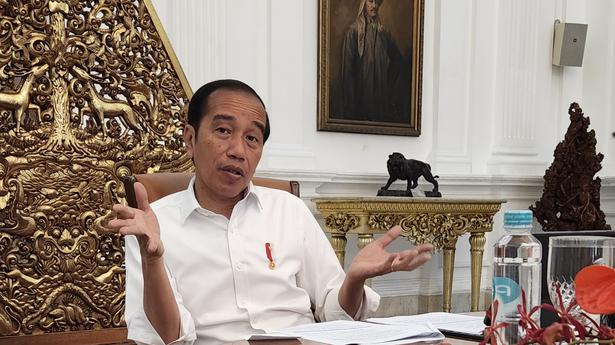
Need to reduce egoism, prioritise food and energy security in Russia-Ukraine conflict: Indonesian President
The Hindu
Indonesian President Joko Widodo says he is ready to help with Modi-Xi meeting at the G20
Indonesian President Joko Widodo is recasting himself as a global peacemaker ahead of the G20 summit in Bali in November this year, where growing tensions between the West and Russia are expected to spill over. In his first interview since his visit to Russia and Ukraine, where he spoke to both leaders and forged an agreement on wheat exports, ‘Bapak’ Jokowi told The Hindu it is time for leaders in the conflict to put their “egos” aside to save the world from disruptions in food and oil supply chains.
My motivation to visit Ukraine and Russia was only one and that is humanity. We need to ensure that we don’t let countries have their civilians starve and fall into extreme poverty because of the problems of the food crisis and the fertilizer crisis — innocent civilians should not become the casualties of war. I wish to appeal to the conscience of the leaders to stop the war immediately. Ukraine and Russia are bread baskets of the world and during my talks, President Zelensky told me they have 20 million tonnes of stocks of grain and new crops of 55 million tonnes in Ukraine. In Russia, President Putin said they have 130 million tonnes. So 270 million tonnes are wheat stocks that the two countries are not being able to be export, which is going to be very dangerous for the world. Even if these commodities could be taken out securely, shipping lines are hesitant to ship out of their ports because of the danger, and high insurance premiums. Since then, I see there are direct talks in Turkey, and I hope this food export issue can be resolved between Ukraine and Russia.
If you look at the meeting of the Foreign Ministers in Bali, the result was productive, in the sense that at least all countries attended and could sit together in one room. The walk-outs that you speak of are, of course, one of the dynamics of the situation [since the Russia-Ukraine conflict]. The space for dialogue that we are providing at the G20 must be utilised. Most importantly, we have to reduce the egoism of leaders for the betterment of the people of the world.
The agenda that we wish to discuss at the G20 would focus on the post-Covid global health architecture, on green economy energy transitions, and digital transformation. These are our priorities, but we know that the war will shift the agenda. We need to see how we can all stop the war, address the issue of food security, energy security, the financial situation, to see how global crises can be resolved. Remember, the G20 is the forum — the only forum that is relevant to address these issues — there are no other forums.
President Putin said he will attend, while for President Zelensky, due to the situation in Ukraine, there is still some uncertainty about his attendance.
The first thing is that we must sit together regardless of whether you belong to one or other blocs, on either side of the spectrum, as well as those who want to sit on the fence. Most importantly, we need to reduce our egoism, promote humanity, give issues like food security and energy security priority.
You have to look at the space for dialogue that is created. If there is a meeting between two major powers like India and China. Indonesia stands ready to mediate — we are always ready to help with anything that will ensure the betterment of people’s lives.













